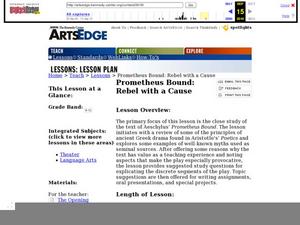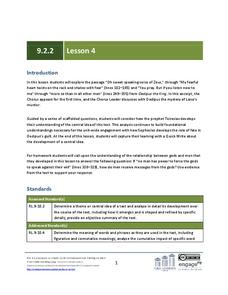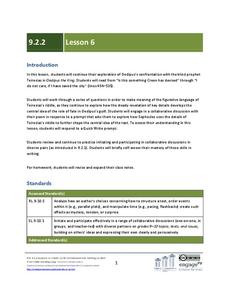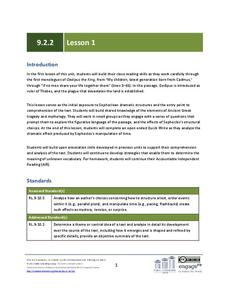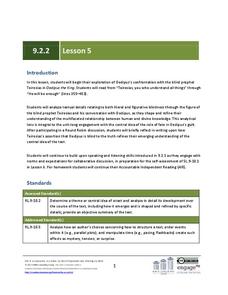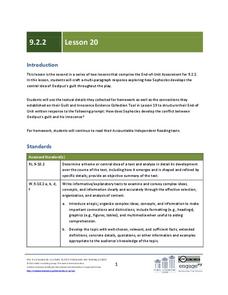Curated OER
Prometheus Bound: Rebel with a Cause
If you are teaching Aeschylus' Prometheus Bound, you can't afford to miss this source. An extensive list of ideas outlines numerous discussion topics, writing prompts, comprehension questions, oral presentations, and projects. Have class...
Curated OER
Sophocles' Oedipus the King
Introduce your class to the Greek tragedy with a study of Sophocles’ Oedipus the King. Learners examine the features of a Greek tragedy, Sophocles’ achievements and contributions, and the universal themes that make the drama an...
EngageNY
Grade 9 ELA Module 2, Unit 2, Lesson 4
The concept of sight, whether it's a lack of sight or abundant sight of the future, plays a vital role in Sophocle's Oedipus the King. Develop your ninth graders' literary vision with a lesson plan that connects the prophecy of Teiresias...
EngageNY
Grade 9 ELA Module 2, Unit 2, Lesson 19
Now that readers can see the full scope of Sophocles' Oedipus the King, they can draw connections between the dramatic ending and the textual evidence throughout the Greek tragedy. As they prepare for the unit assessment writing prompt,...
K20 LEARN
Antigone's Themes Today: The Greek Drama Antigone
Is Antigone relevant to today's readers? After reading Sophocles' tragedy, scholars must decide if the themes are universal and timeless. Class members engage in a series of activities designed to have them closely consider the...
EngageNY
Grade 9 ELA Module 2, Unit 2, Lesson 10
The slow curse of realization begins to sink in during the tenth lesson in a literary analysis unit on Sophocles' Oedipus the King. Ninth graders carefully read the selected lines for evidence of Oedipus' feelings during a turning point...
EngageNY
Grade 9 ELA Module 2, Unit 2, Lesson 13
The text structure is vitally important when crafting a rise in tension. Explore Sophocles' choice to order his events in a particular sequence with a lesson about Oedipus the King. As the light of realization dawns on the characters,...
EngageNY
Grade 9 ELA Module 2, Unit 2, Lesson 15
The terrible truth begins in a lesson that focuses on the final act of Sophocles' Oedipus the King. As ninth graders collect evidence that details the origin of Oedipus and how his birth relates to the prophecy everyone tried to avoid,...
EngageNY
Grade 9 ELA Module 2, Unit 2, Lesson 18
The punishment must fit the crime, even for a king. Sophocles' Oedipus the King meets its grisly end with a lesson that focuses on the conclusion of the play and Oedipus' self-assigned punishment. Learners connect the symbolism of his...
EngageNY
Grade 9 ELA Module 2, Unit 2, Lesson 2
Continue a thoughtful analysis of Sophocles' Oedipus the King by discussing the importance of dialogue within the play's structure. Ninth graders examine how Oedipus speaks about himself to his subjects and Creon before recording their...
EngageNY
Grade 9 ELA Module 2, Unit 2, Lesson 3
The manipulation of time is one of the most essential elements in Sophocles' Oedipus the King. As your language arts class participates in a jigsaw discussion activity, they work together to analyze the play's plot structure and...
EngageNY
Grade 9 ELA Module 2, Unit 2, Lesson 6
The battle of wits and wisdom rages in Sophocles' Oedipus the King, particularly in Oedipus' discussion with Teiresias about the Sphinx's riddle. Ninth graders focus on this crucial conversation with a literary analysis instructional...
EngageNY
Grade 9 ELA Module 2, Unit 2, Lesson 16
Was Oedipus' destiny determined by fate or by his actions? Using details from the text, ninth graders delve into a critical thinking exercise based on Sophocles' Oedipus the King. Now that Oedipus has learned his true identity, readers...
EngageNY
Grade 9 ELA Module 2, Unit 2, Lesson 1
Delve into the heart of dramatic dialogue with a unit focused on Oedipus the King by Sophocles. Having completed an online exploration about ancient Greece beforehand, ninth graders read the play's opening lines and analyze how...
EngageNY
Grade 9 ELA Module 2, Unit 2, Lesson 7
The accusations begin in Sophocles' Oedipus the King, with troublemakers and enemies abound. As learners delve deeply into the sights unseen, they review textual evidence from their readings to write about the importance of timing in the...
EngageNY
Grade 9 ELA Module 2, Unit 2, Lesson 5
Oedipus may be the king, but he certainly does not rule—or see—all. Analyze his interaction with Teiresias in an instructional activity focused on the central idea of Sophocles' Oedipus the King. As pairs of ninth graders discuss...
EngageNY
Grade 9 ELA Module 2, Unit 2, Lesson 8
Prophecy and blindness often go hand in hand, as in Sophocles' Oedipus the King. Explore Oedipus' thoughts about prophecy, fate, and responsibility with an activity focused on the discussion between Creon and Oedipus regarding the murder...
EngageNY
Grade 9 ELA Module 2, Unit 2, Lesson 9
How can a prophecy be true if the future differs from what was foreseen? Sophocles entertains this question in Oedipus the King. Teiresias, Creon, and Oedipus have weighed in on the unsolved murder of Laius, and now Jocasta voices her...
EngageNY
Grade 9 ELA Module 2, Unit 2, Lesson 11
Close readers and forensic detectives alike deal with collecting strong evidence. Ninth graders become involved in an instructional activity about Sophocles' Oedipus the King, in which they find connections between Oedipus' stated words...
EngageNY
Grade 9 ELA Module 2, Unit 2, Lesson 14
The devil—and the truth—is in the details. As ninth graders approach the ending of Sophocles' Oedipus the King, they analyze the words of the Messenger and apply these details to the central ideas of fate and prophecy.
EngageNY
Grade 9 ELA Module 2, Unit 2, Lesson 20
Oedipus' lack of literal and figurative vision does not mean he cannot see his guilt in the terrible fates of Laius, Jocasta, and all the lives touched by prophecy. Conclude a literary analysis unit on Sophocles' Oedipus the King with a...
EngageNY
Grade 9 ELA Module 2, Unit 2, Lesson 17
As Oedipus the King approaches its tragic conclusion, high schoolers discuss Oedipus' reaction to seeing his wife's body. They also examine how Sophocles structures the scene to contribute to the central idea of his play.


